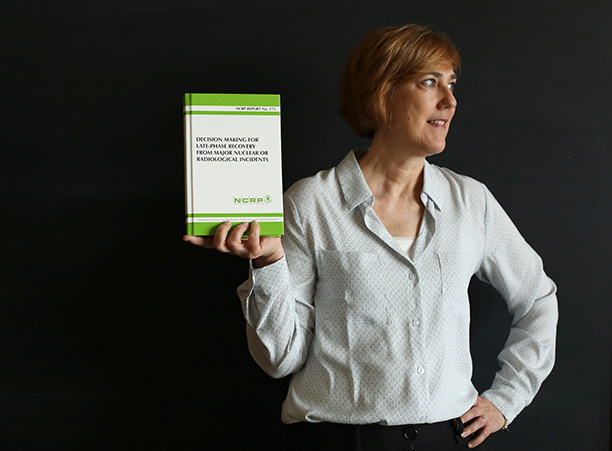 Among the contributors of a comprehensive new report on how communities can take steps toward recovery after a major nuclear incident is Katherine Kiel, professor and chair of the economics and accounting department at the College of the Holy Cross.
Among the contributors of a comprehensive new report on how communities can take steps toward recovery after a major nuclear incident is Katherine Kiel, professor and chair of the economics and accounting department at the College of the Holy Cross.
Kiel, who specializes in urban and environmental economics, was one of seven members of the Scientific Committee overseeing the report. She provided expertise on how local and regional authorities can measure and optimize economic recovery and stabilization following such incidents.
The report, issued by the National Council on Radiation Protection & Measurements, is an exhaustive compendium of guidance on making decisions and setting policies in the aftermath of a major nuclear accident or an act of terrorism involving a radiological dispersal device (such as a dirty bomb) that result in wide-area contamination with radioactive materials.
Since it was chartered by Congress in 1964, the NCRP’s council of scientific experts formulates and disseminates information, guidance and recommendations on radiation protection and measurements.
The new report considers the long-term consequences of widespread contamination and provides guidance on managing the cleanup and community restoration efforts. In addition to economic matters, health, environment, psychological, cultural, ethical and political issues are addressed
Kiel’s contribution focuses on how to measure the economic health and recovery of a local area, as well as how to think about decision making in a broader sense. She was also involved in report sections that considered the potential of stigma after an event and how that might be remediated or minimized.
As one of the report authors, Kiel was responsible for identifying and bringing in the relevant economics models and literature. She reviewed the work done by others in the field of economics, including research on recovery efforts following Hurricane Katrina conducted by her Holy Cross colleagues, Associate Professor Robert Baumann and Professor Victor Matheson.
“I think the key takeaway is that recovery from a catastrophic event requires planning in advance of the event itself. It is important to have data collected ahead of time, and to update those data throughout the process. It is also important to have laid the groundwork for stakeholder involvement and shared communication,” Kiel said.
“Writing this report reminded me how important it is to have groups working together that come from a variety of backgrounds and disciplines. We have a lot to learn from one another, and need to be able to come together to share that information.
“It’s clearly another reminder that a good liberal arts education is helpful in the ‘real world.’ ”
Kiel has published articles in the areas of real estate price indices, racial discrimination in the housing market, and the demand for environmental quality in the U.S. She is a board member for the New England Economic Partnership, a non-profit organization that provides objective economic analyses and forecasts for the New England area.
At Holy Cross, she is cochair of the Presidential Task Force on the Environment, a College-wide body assigned by the president for overseeing the College’s response to the challenge of sustainability. She earned a bachelor’s degree from Occidental College and a Ph.D. from the University of California, San Diego.
The report can be ordered from the NCRP website in both PDF and hardcopy formats.
Related Information
Holy Cross Economics Professor Contributes to New Scientific Report on Catastrophic Nuclear Recovery
Read Time
2 Minutes